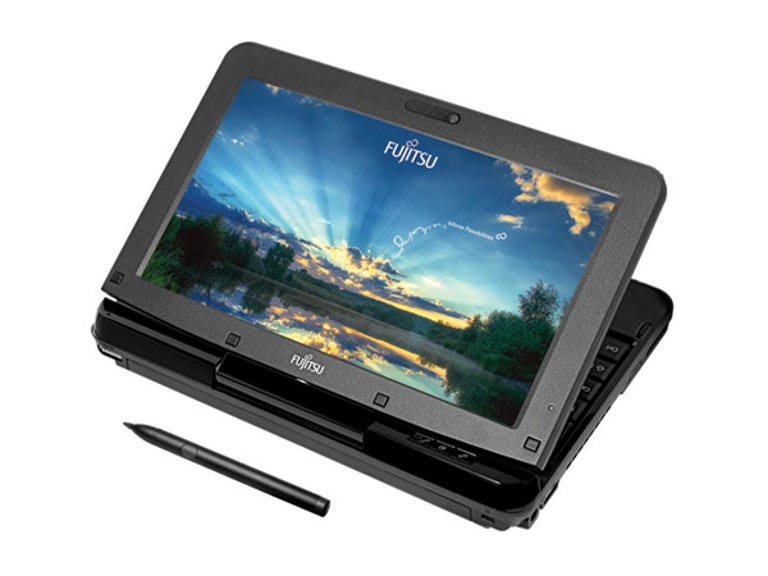 Why You Can Trust CNET
Why You Can Trust CNET Fujitsu Lifebook TH550 review: Fujitsu Lifebook TH550
The Lifebook TH550 is a well-built system with the kind of expected high price tag that Fujitsu usually applies to its PC wares. It's a nice convertible tablet for the business market, but those on a tighter budget may wish to look elsewhere.
Design
Tablets sans keyboards may be the current flavour of the month, but not according to the design bible of Fujitsu. The TH550 is a 10.1-inch convertible tablet with keyboard, giving it the appearance of a slightly larger than normal netbook. Although at a price starting at AU$1599, it's rather more costly than any netbook currently on the market. Unlike many convertible tablets, you're not constrained by flipping the screen one way or the other, as it'll very comfortably spin through a full 360 degrees, allowing you to orient it however you'd like.
The Good
The Bad
The Bottom Line
Fujitsu also hasn't wasted all that much space when it comes to the keyboard, which is a common complaint we have with smaller netbook-style computers. The keyboard stretches the full length of the case, giving the keys a (relatively) large span. This makes typing relatively easy, although users accustomed to an 11- or 13-inch laptop may still find it a little cramped.
Features
The Lifebook TH550 is still at its heart a Windows notebook; in this case it's running Windows 7 Professional 64-bit edition. It utilises a relatively low-end Core i3 U380 1.33GHz processor. No monster of a CPU, that, but combined with 2GB RAM it should handle most productivity tasks well enough. Graphics are handled by Intel's HD Graphics solution, further solidifying this as a productivity rather than graphics-heavy laptop/tablet, although one interesting inclusion here is an HDMI port out the back of the tablet itself. That'll lend itself more to presentations than heavy gaming sessions, however.
A 500GB hard drive provides the storage capabilities of the Lifebook TH550, along with a relatively meagre two USB 2.0 ports. There's no optical drive provided, and if you wanted to use one you'd be left with only one USB port for other duties. Networking is rather more promising with gigabit Ethernet, Bluetooth 2.1 and 802.11n Wi-Fi. The 10.1-inch 1366x768-pixel display is multi-touch capable with up to four fingers or the supplied stylus.
Performance
The Lifebook TH550 performed almost exactly as we'd expect a Core i3 system like this to do in our standard benchmarks. Its PCMark05 score of 3534 and 3DMark06 score of 1140 are exactly what we'd expect given the components on offer.
As with any tablet, there's more to the Lifebook TH550 than just the sum of its benchmark scores. From a practical usage standpoint, the Lifebook TH550 gets around our most common complaint about touchscreen Windows 7 notebooks, namely that you have to reach past the perfectly functional keyboard to get to the touchscreen controls, at which point, why bother? It does this by being fully convertible. We still can't see too many users reaching past the keyboard when it's fully open, but when folded up tablet style, it's not there at all, and the sensitivity of the screen is such that either stylus or finger is enough to launch most tasks.
We ran the Lifebook TH550 through our standard tough battery test, pushing brightness up to full whack, disabling all power-saving utilities and running an XviD file full screen until the system went into hibernation. As always, you should get better figures than we do with these tests in "real" usage; we're deliberately trying to establish a lowest expected figure. The Lifebook TH550 carried on playing for three hours and 18 minutes from its six-cell battery. That's well below the manufacturer's stated "up to" 7.3 hours, but it's suggestive of a unit that could last a full day's work if used only moderately away from a power source.
Conclusion
The Lifebook TH550 is a well-built system with the kind of expected high price tag that Fujitsu usually applies to its PC wares. It's a nice convertible tablet for the business market, but those on a tighter budget may wish to look elsewhere.


